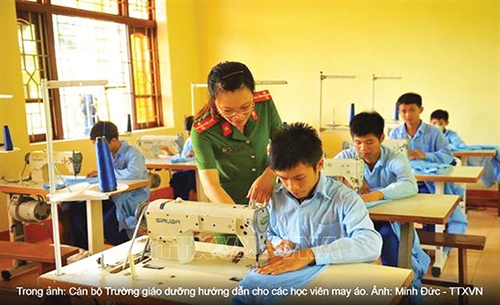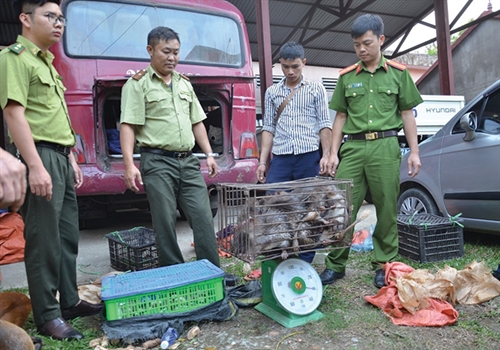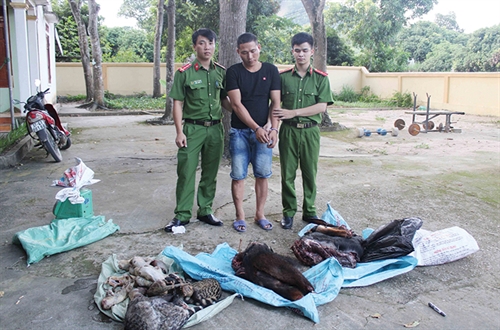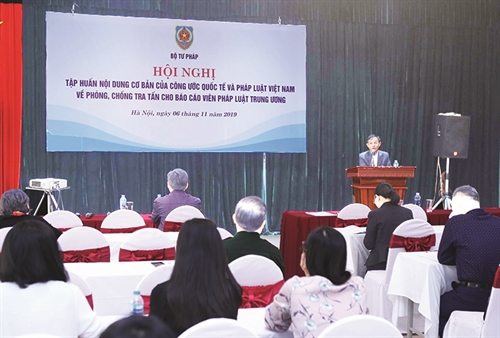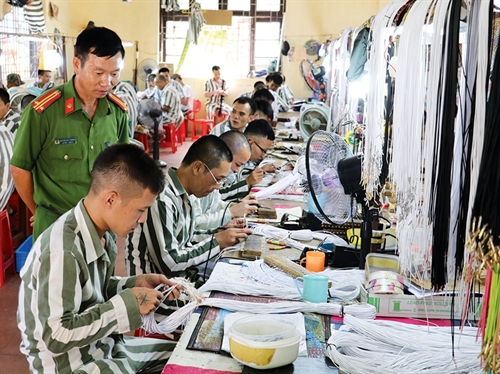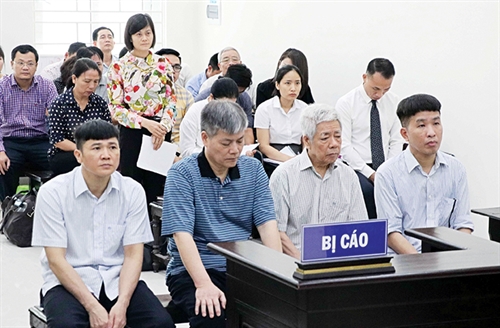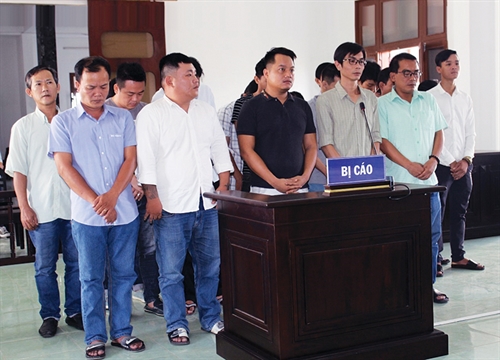Dao Le Thu, Ph.D.
Comparative Law Institute
Hanoi Law University
Overview
Vietnam’s criminal law’s evolution landmarks include the first-ever 1985 Penal Code, 1999 Penal Code (revised in 2009) and the latest Penal Code passed in 2015 (revised in 2017). Each of these codes and its revised version was imbued with characteristics of certain criminal legislation trends in its effective period. In the initial stage of codification of Vietnam’s criminal law, international aspects were embodied in a very moderate manner. The 1985 Penal Code only recognized some international criminal law principles regarding some crimes in order to protect interests of the international community. The 1999 Penal Code went further with some revisions to guarantee Vietnam’s responsibility as a state party to a number of conventions and treaties on criminal justice. However, these two codes have not yet initiated the internationalization trend of Vietnam’s criminal law. Until the 2009 Code revising the 1999 Penal Code and the 2015 Penal Code (revised in 2017), such trends as modernization, benevolence, international integration, judicial reform and respect for human rights are embraced. So, for what reasons Vietnam’s criminal law has been influenced by international criminal law and more and more clearly leaned toward consistency with international criminal law?
Firstly, the 1985 Penal Code was enacted while Vietnam had very few international cooperation relations and not yet integrated itself into international socio-economic domains and therefore was not much of meeting requirements of criminal justice conventions on crime prevention and combat and providing adequate and favorable conditions for international cooperation in crime prevention and combat.
Over the recent years, the country has more and more actively integrated into the international community through joining international and regional institutions and becoming a state party to numerous multilateral and regional treaties on prevention and combat of international and transnational crime[1]. These treaties require state parties to include in their domestic laws such mandatory rules as establishment of jurisdiction of national criminal legislation to serve as a ground for examination of penal liability, criminalization of certain types of socially dangerous acts and establishment of criminal law institutions for determination of crimes. The revision of the 2015 Penal Code also brought about an opportunity for Vietnam to continue including in its domestic laws criminal provisions of treaties to which it is a state party in order to fulfill its obligations.
Secondly, in the context of international integration and globalization, Vietnam’s crime prevention and combat have been facing the growing number of transnational organized crimes and crimes committed by foreigners. Meanwhile, other international core crimes and transnational crimes such as war crimes, crimes against humanity, drug-related crimes, human trafficking, money laundering, terrorism and terrorism financing, and crimes using high technologies have become more complicated and severe, causing greater impacts and concerns for the international community in general and nations in particular. Therefore, improving legal mechanisms to create favorable legal grounds for proactive and enhanced international cooperation in fighting crimes, particularly transnational organized crimes, is an inevitable trend in the modern time.
Thirdly, phenomena that have given rise to the trend of internationalization in the criminal legislation of many countries around the world are legal harmonization and legal unification. Criminal legislation in many regions in the world has been reformed this way toward harmony and ultimate unity. Such concepts as “international criminal law”, “transnational criminal law”, “regional criminal law”, “comparative criminal law”, etc., have emerged and developed vigorously with considerable efforts of nations in bringing their domestic criminal laws up to international legal standards on protection of human rights and combat of crimes dangerous to the community and better ensuring modernity of criminal law discipline in the world[2].
Internationalization trend showed in Vietnam’s 2015 Penal Code
Internationalization in Vietnam’s criminal policies
With important new provisions compared to its predecessors, the 2015 Penal Code (the Code) shows radical changes in criminal handling policies, of which the most remarkable ones are prescribing criminal liability of commercial legal persons and humane policies in provisions on penalties applicable to juvenile offenders and more cordial attitude in criminal handling toward juvenile offenders. All these reflect the internationalizing trend of Vietnam’s criminal legislation.
Firstly, criminal liability of commercial legal persons prescribed in the Code aims to implement recommendations of conventions against corruption, money laundering, human trafficking, terrorism and terrorism financing to which Vietnam is a state party. Besides, as a member of the Asia/Pacific Group on Money Laundering (APG), Vietnam committed to implement the recommendations of the Financial Action Task Force (FATF), including the second recommendation on criminal liability of legal persons. In the context of increasing business and investment opportunities of Vietnam businesses in foreign countries as well as of foreign businesses in Vietnam, it would be unfair for businesses that commit the same crime if Vietnam does not prescribe criminal corporate liability like most countries in the region and the world[3]. However, the Code applies criminal liability only to commercial legal persons and specifies crimes for which commercial legal persons may bear criminal responsibility and penalties to be imposed for such crimes based on theoretical studies and doctrines into grounds for and characteristics of criminal liability of legal persons and criminal law-making experiences of the developed countries.
The Code also contain some radical changes in criminal justice for juvenile delinquents in order to better comply to the principles of the 1989 United Nations Convention of the Rights of the Child. They are embodied in revised principles of handling juvenile offenders[4], including two new principles of guaranteeing the best interests of juveniles in the light of the Convention and considering application of alternative measures before deciding on imposing criminal liability on juvenile offenders, and a reaffirmed principle that penalties, especially imprisonment, may only be imposed on juvenile offenders as a measure of last resort after considering application of other judicial measures and for the shortest appropriate period of time[5].
As per Section 2, Chapter XII of the Code, when handling juvenile offenders, proceeding-conducting bodies may decide on exemption from criminal liability and application of supervision and education measures[6] when such offenders: (i) commit for the first time less serious or serious crimes but containing extenuating circumstances and are willing to remedy consequences of their crimes; (ii) together with their lawful representatives consent to the application of such measures. These provisions aim to divert juveniles from criminal proceedings and apply measures of educational and preventive nature to help them recognize their mistakes and show their repentance and remedy their wrongdoings.
Aforesaid changes in Vietnam’s criminal policies in favor of juvenile offenders have been realized on the basis of recommendations in international legal instruments regarding protection of children[7] as well as such principles as child-friendly justice, restorative juvenile justice, and diversion measures in compliance with these recommendations.
Internationalization in the General Provisions of the Code
Firstly, the Code recognizes the principle of passive personality and the protective principle (protection of national sovereignty and security)[8]. This provision affirms the effect of Vietnam’s criminal law on criminal acts committed outside the Vietnamese territory by persons not bearing the Vietnamese citizenship with their victims being Vietnamese citizens or infringing upon Vietnam’s national security interests.
Secondly, in order to provide legal grounds for proactive early prevention of crimes in spirit of the UN Convention against Transnational Organized Crime (UNTOC or Palermo Convention) to which Vietnam is a state party, the Code criminalizes the act of forming or joining a criminal group in order to commit a specific crime, in addition to searching for and preparing tools, vehicles or creating other conditions to commit a crime as previously prescribed in the 1999 Penal Code[9]. This shows the internationalization trend of Vietnam’s criminal legislation whilst the recognition of criminal organizations (or organized crime groups) and the criminalization of the participation in such groups under the Palermo Convention have become more and more common in national criminal laws around the world[10].
Thirdly, the Code adds provisions in Articles 28.3 and 61 on non-application of the statute of limitations for criminal responsibility and non-application of the statute of limitations for judgment execution for the offenses of embezzling property and taking bribes in cases they are of particularly serious crimes. Under these provisions, persons that commit such particularly serious corruption crimes can be prosecuted or have judgments against them executed any time if their criminal acts are detected or judgments against them are found unexecuted. This shows Vietnam’s efforts as a state party to the UN Convention against Corruption (UNCAC)[11].
Fourthly, the Code adds provisions on defenses for the exemption from penal liability[12], including four circumstances (unexpected events, self-defense, necessity, and state of having no penal liability capacity) previously specified in the 1999 Penal Code, and three new defenses of causing damage while arresting offenders; risks in research, testing or application of scientific, technical or technological advances; and execution of orders of commanders or superiors[13].
Fifthly, the Code narrows down the scope of application of the death penalty and imprisonment penalty while increasing non-custodial penalties and providing conditional early release. Specifically, the Code abolishes death penalty for seven crimes after Vietnamese law makers have considered the international community’s recommendations on abolition or narrower scope of application of death penalty and learned from experiences of the countries where the death penalty is still executed[14], retaining it only for some particularly serious crimes against the State, infringing upon human life or related to drugs.
It broadens the scope of application of fine for less serious crimes, particularly for crimes infringing upon the economic management orders and environment-related crimes (fine may be imposed as a principal penalty for very serious crimes while non-custodial reform may also be imposed for very serious crimes committed unintentionally), and no longer imposes imprisonment on persons unintentionally committing less serious crimes[15]. At the same time, the number of clauses not prescribing imprisonment penalty remarkably increases compared to the 1999 Penal Code as a result of the recent shift from the ‘retributive theory’ to the ‘preventive theory’ in criminal justice.
Conditional early release is also a new measure showing a common trend of many developed countries’ criminal law which allows sentence-serving persons to return and integrate themselves into the community earlier for education and reform with assistance of their families, managing agencies and social organizations.
Criminalization of socially dangerous acts as required by relevant conventions to which Vietnam is a state party
Firstly, the Code additionally criminalizes acts of employing persons aged under 16 years for the purpose of pornography and trading in or appropriating human tissues or organs[16]. The criminalization of the act of employing persons aged under 16 years for the purpose of pornography expresses Vietnam’s fulfillment of its duty as a state party to the 1989 UN Convention of the Rights of the Child and the ILO’s 1999 Convention concerning the Prohibition and Immediate Action for the Elimination of the Worst Forms of Child Labor[17]. Given the severity and complicated evolution of acts of trading in and appropriating human tissues and organs, the United Nations’ General Assembly adopted on February 3, 2005 Resolution No. 59/156 on preventing, combating and punishing trafficking in human organs, while the United Nations Global Initiative to Fight Human Trafficking widely recommended the criminalization of these acts as a type of organized crime under the Palermo Convention and different from the crime of human trafficking[18].
Secondly, the Code adds provisions on the crimes of taking hostages and piracy[19] in compliance with the 1979 UN Convention against Taking of Hostages and the 1982 UN Convention on the Law of the Sea to which Vietnam is a state party.
Thirdly, the Code expands the scope of the crimes of embezzling property, taking bribes, offering bribes and acting as intermediaries in bribery[20] to the non-state sectors. The expansion of these position-related crimes is necessary and attributable to ever-increasing severity and adverse impacts of corrupt practices in the private sector, requirements on criminalization of acts infringing upon duty performance in the private sector to maintain fair competition in the non-state sectors, and necessity to help protect the community from dangerous consequences of corrupt acts in the private sector against its financial interests and other social interests. Besides, the UNCAC also recommends adoption by state parties of anti-corruption measures not only in the public sector but also in the private sector[21].
In addition, the Code establishes as a circumstance of the crime of offering bribes the act of offering bribes to foreign public officials or officials of public international organizations[22] in compliance with the UNCAC’s recommendation on establishing as a crime such act[23].
Addition of constituent elements of a number crimes
Firstly, the Code contains revised provisions on the crimes of human trafficking and trafficking in persons aged under 16 years[24] in compliance with the Protocol to Prevent, Suppress and Punish Trafficking in Persons, especially Women and Children (to the UNTOC); and specifies more clearly the elements of prohibited acts, means employed to commit, and purposes of, these crimes.
Secondly, the Code revises the crime of money laundering[25], defining more clearly types of money laundering acts, the act of money laundering for oneself, and less required fault element, and additionally prescribes criminal liability of legal persons for money laundering in order to fulfill requirements of the FATF’s recommendations.
Thirdly, the Code revises the crimes of using corporal punishment and coercion of testimony[26] to implement recommendations of the UN Convention against Torture.
Fourthly, the Code revises the whole Chapter XXVI on crimes against peace, crimes against humanity and war crimes with constituent elements of these crimes more conformable with the relevant international legal standards and meeting requirements of Vietnam’s external relations in the new period.
Some inconsistencies between Vietnam’s criminal law and international criminal law
Firstly, the Code’s provisions on criminal liability of commercial legal persons, supervising and educational measures in case of exemption from criminal liability for juvenile offenders, as well as the criminalization of corruptive acts in the private sector have not yet fully and truly reflected the essence of the international criminal law standards or remain unspecific.
Specifically, the provisions on criminal liability of commercial legal persons remain inconsistent in terms of reflecting its nature. For instance, it appears somewhere as derivative responsibility resulted from the criminal act committed by individuals while in some other provisions it is stipulated differently as totally separated from the acts of individual offenders.
In essence, education and supervision measures provided by the Code to be applied to juvenile offenders who are exempted from penal liability cannot be truly regarded as diversion measures provided by international standards and domestic criminal laws of the countries with advanced criminal legislation in this regard. This is because Vietnam’s criminal law regards these measures merely as the result of the exemption from penal liability for juvenile offenders and may only be applied from the stage of prosecution as criminal handling measures (but not criminal penalties). Meanwhile, international standards on diversion measures, including community-based measures and restorative measures, define them as an alternative to criminal handling of juvenile offenders through formal legal proceedings[27].
The Code’s provisions on corruption crimes in the private sector as well as offering of bribes to foreign officials[28] are exceeding the UNCAC’s relevant provisions in terms of scope of commercial, economic and financial activities in which these crimes are committed and fail to clearly differentiate private-sector corruption from public-sector corruption, offering bribes to foreign officials from offering bribes to domestic officials like the developed countries[29].
Secondly, the Code’s new provisions on penal liability in the stage of preparation for crime commission of persons forming or joining criminal gangs are not fully conformable with requirements on criminalization of acts of participation in organized criminal groups under the Palermo Convention. Under this Convention, any act of forming or joining of an organized criminal group, not only from the stage of preparation for crime commission, is treated as a fully constituted crime. The key point is that Vietnam’s criminal law has no provision on organized criminal groups and does not yet criminalize acts of participation in these groups in the light of the Palermo Convention.
Aforesaid differences and consistencies between Vietnam’s criminal law and international criminal legislation have slowed down the former’s internationalization process and should be addressed in terms of both normative contents and legislative techniques as soon as possible.
In fulfilling the duty of a state party to conventions on criminal justice, Vietnam should continue studying from the developed countries’ experiences and practices of application of the analyzed criminal legislation institutions as well as relevant legal precedents in order to further improve and effectively implement the domestic criminal law, especially for interpretation and guidance on application of aforesaid new provisions.-
THE END
[1] For example, the United Nations Convention against Transnational Organized Crime (Palermo Convention) and the Protocol to Prevent, Suppress and Punish Trafficking in Persons, Especially Women and Children; the United Nations Convention against Corruption; the United Nations Convention against Torture; and conventions and treaties against terrorism, terrorism financing, money laundering, piracy, taking of hostages, etc.[2] See Antonio Cassese et al., Cassese’s International Criminal Law, Oxford University Press, Oxford 2013; Neil Boister, An Introduction to Transnational Criminal Law, Oxford University Press, Oxford, 2012; Markus Dirk Dubber, “Comparative Criminal Law” in the Oxford Handbook of Comparative Law, M. Reimann & R. Zimmermann (eds), Oxford University Press, Oxford 2006, pp 1287-1325.[3] There are 119 countries in the world that apply penal liability to legal persons, including six ASEAN member countries (Singapore, Malaysia, Thailand, the Philippines, Indonesia and Cambodia). [4] Article 91 of the Code.[5] See Article 37 of the Convention on the Rights of the Child.[6] These measures include reprimand, community-based reconciliation, and education at communes, wards or townships.[7] Such as the United Nations Standard Minimum Rules for the Administration of Juvenile Justice, United Nations Rules for the Protection of Juveniles Deprived of their Liberty, and United Nations Guidelines for the Prevention of Juvenile Delinquency.[8] Article 6.2 of the Code stipulates: “Foreigners and foreign commercial legal persons that commit crimes outside the territory of the Socialist Republic of Vietnam may be examined for penal liability in accordance with this Code in case their criminal offenses infringe upon the lawful rights and interests of Vietnamese citizens or the interests of the Socialist Republic of Vietnam, or in accordance with treaties to which the Socialist Republic of Vietnam is a contracting party.”[9] Article 14 of the Code.[10] See for more information: Francesco Caldroni (2010), Organized Crime Legislation in the European Union: Harmonization and Approximation of Criminal Law, National Legislation and the EU Framework Decision on the Fight against Organized Crime, Springer Publishing House; or in many Asian countries, athttps://www.unafei.or.jp/publications/pdf/RS_No59/No59_45RC_Group2_Phase2.pdf. [11] Article 29 of UNCAC: “Each State Party shall, where appropriate, establish under its domestic law a long statute of limitations period in which to commence proceedings for any offence established in accordance with this Convention and establish a longer statute of limitations period or provide for the suspension of the statute of limitations where the alleged offender has evaded the administration of justice.”.[12] Chapter IV of the Code.[13] Articles 24, 25 and 26 of the Code.[14] These countries include the United States of America, the Russian Federation, the People’s Republic of China, Japan, Thailand, Indonesia and Malaysia.[15] Articles 35, 36 and 37 of the Code.[16] Articles 147 and 154 of the Code.[17] See Article 34 of the Convention of the Rights of the Child and Article 3 of the Convention concerning the Prohibition and Immediate Action for the Elimination of the Worst Forms of Child Labor.[18] See Article 34 of the Convention of the Rights of the Child and Article 3 of the Convention concerning the Prohibition and Immediate Action for the Elimination of the Worst Forms of Child Labor.[19] Articles 301 and 302 of the Code.[20] Articles 353, 354, 364 and 365 of the Code.[21] See Articles 21 and 22 of the UNCAC.[22] Article 364.6 of the Code.[23] Article 16 of the UNCAC.[24] Articles 150 and 151 of the Code.[25] Article 324 of the Code.[26] Articles 373 and 374 of the Code.[27] See for example: The United Nations Standard Minimum Rules for the Administration of Juvenile Justice (the Beijing Rules) - issued under the United Nations General Assembly’s Resolution No. 40/33 dated November 29, 1985.[28] Articles 353.6, 354.6, 364.6, and 365.7 of the Code.[29] For example, the Bribery Act of England; Foreign Corrupt Practices Act of the United States of America; and the Criminal Code of the Republic of France (Articles 435.1, 435.2, 435.3, and 435.4).
